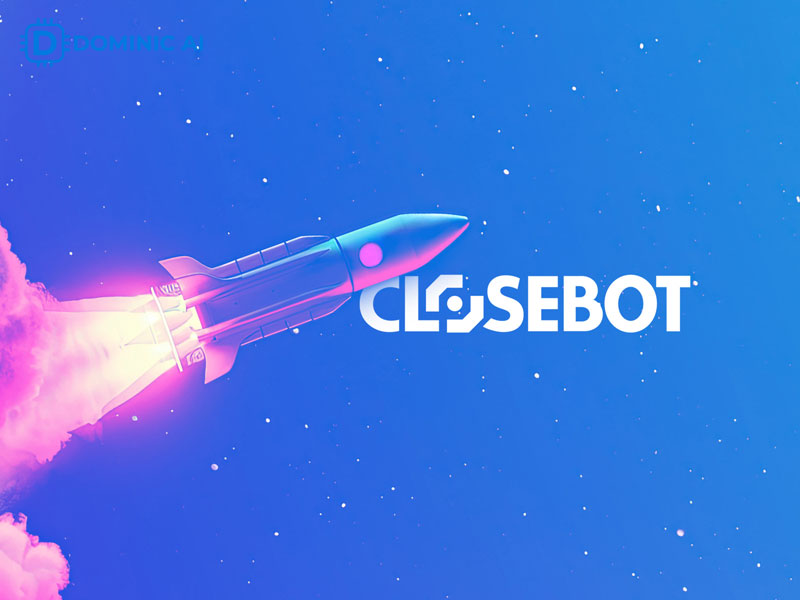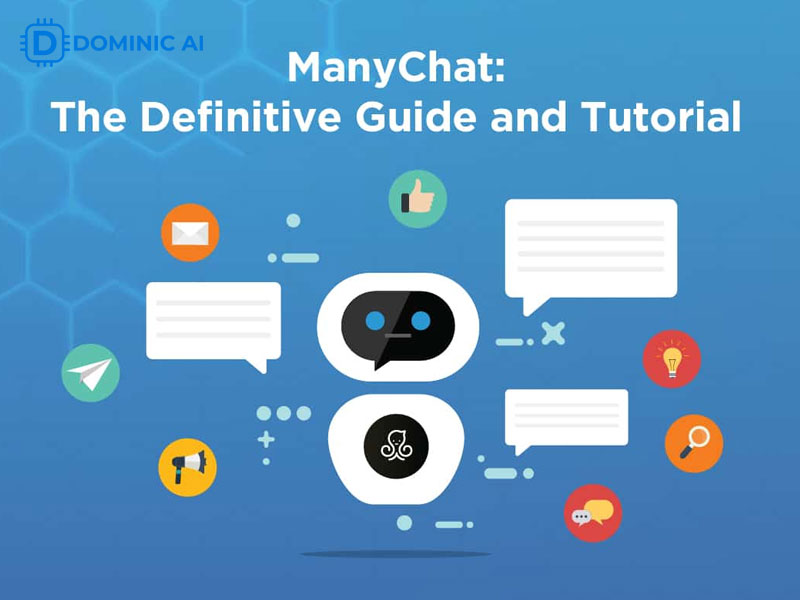CloseBot AI vs ManyChat: Which One Is Better?

When it comes to chatbots, choosing the right platform can transform how you engage with customers. In this guide, we’ll dive into CloseBot AI vs ManyChat and uncover what sets them apart. Together with Dominic AI Tools, we’ll explore their differences in features, usability, and real-world applications—so you can confidently select the solution that works best for your business.
Platform Overview
Before diving into the details, it’s crucial to understand the core focus and strengths of each platform. This understanding will guide your decision based on your specific business needs and goals.
CloseBot AI
CloseBot AI is designed as an intelligent, AI-driven sales assistant. Its core strength lies in its niche-specific optimization and ability to deeply integrate with CRM systems.

CloseBot AI
CloseBot AI excels as a powerful tool for agencies managing multiple clients across various niches. By offering tailored AI bots specific to individual industries (or even sub-industries), CloseBot AI allows agencies to deliver specialized, high-performance automation solutions without needing to build custom funnels from scratch. The pre-trained nature of these niche-focused bots means faster setup, quicker results, and the capacity to deliver more significant ROI for clients. This makes CloseBot AI a compelling choice for agencies aiming to scale their operations and provide highly customized services.
ManyChat
ManyChat positions itself as a versatile Messenger and social media automation platform. It’s widely adopted, known for its user-friendly interface, and particularly strong in the e-commerce sector.

ManyChat
ManyChat’s widespread adoption is due in large part to its ease of use and focus on social media automation, particularly within Facebook Messenger and Instagram. This platform provides a more visual, drag-and-drop flow builder, making it accessible to users who aren’t necessarily technical experts. Its strength in e-commerce marketing and customer support results from integrations with popular systems like Shopify, its focus on conversational marketing, and its support for features like abandoned cart reminders and personalized product recommendations. ManyChat is ideal for businesses that want to leverage the power of social media messaging to drive sales and engage with their customer base.
Features Comparison
The real differentiator between CloseBot AI and ManyChat boils down to their individual features. Both are strong but excel in different areas based on their specialization.
AI & Automation Capabilities (CloseBot AI’s niche-based bots vs ManyChat’s flow builder).
CloseBot AI leverages its AI capabilities through niche-based bots, specifically designed to address the unique pain points of specific industries. Each bot is pre-trained with industry-specific data, allowing it to immediately understand and respond to customer inquiries with a high degree of accuracy.
CloseBot AI leverages AI to understand intent and personalize customer interactions, tailoring the flow of conversations based on specific needs. ManyChat’s strength lies in its intuitive flow builder, which lets users design conversational sequences for various purposes —lead generation, customer service, etc. These sequences are primarily rule-based and rely on predefined triggers and keywords to determine the next step in the conversation. While ManyChat does incorporate some AI features (keyword recognition and sentiment analysis), it doesn’t have the same level of deep, intent-driven AI that powers CloseBot AI’s niche-based bots. This difference makes CloseBot AI better suited for complex interactions where understanding context and intent is critical, while ManyChat excels at automating repetitive and predictable customer interactions.
CRM & Integration (CloseBot AI deep CRM connections vs ManyChat’s social platform focus).
CloseBot AI is built with a strong focus on CRM integration. It facilitates deep connections with various CRM platforms, which allows for the automatic updating of customer data, the personalization of communication based on CRM data, and the creation of targeted campaigns based on customer segments.
ManyChat’s integration ecosystem focuses on the social media platforms where it excels (Facebook Messenger, Instagram, and WhatsApp), along with popular e-commerce platforms like Shopify and email marketing services like Mailchimp. This approach makes ManyChat an excellent option for businesses prioritizing social media engagement and driving sales from social channels. CloseBot AI, on the other hand, extends beyond social media by allowing for seamless integration with diverse CRMs. This becomes a notable advantage for businesses that want to create holistic, cross-channel customer communication strategies and maintain a unified customer view across their different marketing and sales tools.
Conversation Personalization (CloseBot AI intent-driven vs ManyChat keyword & trigger based).
CloseBot AI uses its AI capabilities to personalize conversations based on user intent, interpreting and responding to user queries with a level of understanding that leads to highly relevant and dynamic interactions.
ManyChat relies primarily on triggers and keywords to personalize conversations, allowing for some degree of customization in message flows. However, this personalization is largely based on predefined rules. Conversely, CloseBot AI aims to provide dynamic, intent-driven personalization wherein the bot adapts the conversation based on what it learns from the customer’s input in real time. This allows for more natural, human-like conversations and more effective resolution of customer issues.
Multi-channel Support (CloseBot AI: CRM, email, WhatsApp, SMS vs ManyChat: Messenger, Instagram, WhatsApp).
CloseBot AI supports a comprehensive range of channels, including CRM, email, WhatsApp, and SMS, providing for a unified and consistent engagement across various touchpoints.
ManyChat primarily focuses on supporting a limited number of channels that are aligned with its social-media-centric approach. Specifically, its main support offerings are Facebook Messenger, Instagram, and WhatsApp. This channel focus proves to be extremely beneficial for businesses that prioritize social media engagement and drive sales through social platforms. CloseBot AI’s channel capabilities give businesses greater flexibility in creating a seamless, multi-channel customer experience. The extensive support for various channels across both platforms allows businesses to engage with their customers in the channels they prefer.
Ease of Use
The practicality of these platforms depends on whether their ease of use matches the capabilities they offer.
The setup process with CloseBot AI can vary depending on the desired level of customization. While the niche-specific bots facilitate rapid deployment, some businesses may require custom training or adjustments to better align with their specific workflows. This might involve some initial learning and hands-on involvement to fully leverage the platform’s potential. Many Chat’s intuitive interface allows businesses to quickly build automation flows, and it offers extensive guides for onboarding.
CloseBot AI is well suited for technically proficient users who are comfortable working with AI-driven automation tools and managing data integrations with CRM systems. ManyChat, in contrast, is better suited for users with limited technical skills, and it offers user-friendly flow builders and setup processes.
Pricing & Scalability
Understanding the pricing structure and scalability of each platform is essential for businesses aiming for long-term growth and cost-effectiveness.

Pricing & Scalability
CloseBot AI: pricing per niche/bot → good for agencies.
CloseBot AI offers pricing per niche or per bot. This pricing structure can be particularly advantageous for agencies or businesses that manage multiple clients or need specialized solutions for different business areas.
CloseBot AI’s pricing strategy offers several benefits. Firstly, it supports scalability for agencies by allowing for the addition of new niche bots as their client base expands. Secondly, it allows for agencies or business to invest only in the specific solutions they need, without paying for a broad suite of features they may not use. Thirdly, it aligns costs with the specific value delivered by each bot, which allows for a clear understanding of ROI. However, businesses that need automation across multiple niches may find the cost structure of CloseBot AI more expensive than ManyChat, which is based on subscriber tiers. Ultimately, the most cost-effective solution will depend on the complexity and range of a business’s automation needs.
ManyChat: tiered pricing based on subscribers.
ManyChat offers tiered pricing that’s largely based on the number of subscribers. This makes it a predictable and scalable option for businesses that prioritize reach and engagement on social media platforms.
This pricing structure makes it attractive to businesses that are rapidly growing their subscriber base. ManyChat’s free plan allows users to test out essential features before committing to a paid plan. Paid plans generally unlock advanced features and larger subscriber limits. For businesses with large subscriber counts and multi-channel needs, CloseBot AI’s niche-based pricing may become more economical in the long run.
Which is more cost-effective depending on use case. The answer is wholly dependent on the specific requirements of the business. For businesses that require focused AI solutions within niche verticals, CloseBot AI offers a compelling ROI. For social-media-centric businesses that prioritize broad engagement and subscriber reach, ManyChat’s pricing may emerge as more cost-effective.
Pros & Cons
To highlight the specific strengths and weaknesses of each platform, here is an overview of the pros and cons.
CloseBot AI
Pros
- Strong AI & personalization: Its ability to understand and respond to customer intent enables highly relevant and effective conversations.
- Niche-focused, scalable for agencies: The pricing and modular design are advantageous for agencies looking to provide specialized automation services.
Cons
- Less mainstream than ManyChat: This could mean less community support and fewer available integrations outside of its core focus.
ManyChat
Pros
- Popular & easy to use: Its intuitive interface makes it accessible to users with limited technical expertise.
- Great for e-commerce and social media: Its strong e-commerce integrations and focus on social media channels make it ideal for businesses that want social media engagement.
Cons
- Limited advanced AI capabilities: Its reliance on predefined rules limits its ability to handle complex or nuanced interactions.
Best Use Cases
To further narrow down which platform is right for your business, let’s explore the specific scenarios each excels in.
When to choose CloseBot AI: Consider CloseBot AI when you require the power of AI-driven automation to handle high-stakes, CRM-heavy workflows. Agencies that want a scalable, niche-focused solution for multiple clients will also find CloseBot AI to be an excellent fit. Businesses involved in B2B sales should consider CloseBot AI because of how well it handles complexity.
When to choose ManyChat: Opt for ManyChat if your business centers on direct-to-consumer sales (DTC), e-commerce, and driving business success through Instagram and Facebook campaigns. ManyChat is also beneficial for businesses whose primary engagement channel is social media.
To make finding the right AI solutions easier, Dominic AI Tools helps you explore, compare, and select the best options for your needs. With clear insights and trustworthy guidance, it’s a reliable place to understand how powerful tools—such as insights from CloseBot AI vs GHL—can transform the way you work and grow. Start exploring today and discover smarter solutions for your business.

Dominic AI Tools is more than just a directory. It’s a curated platform with over 1,800 AI tools—spanning categories like business, marketing, design, chatbots, productivity, and development. Updated daily, the brand ensures you always stay ahead with the latest and most reliable software. At its core, Dominic AI Tools represents simplicity and clarity in the crowded AI marketplace: a single place where discovery, comparison, and mastery of AI tools become effortless.
